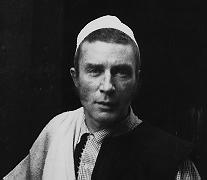 I am not a professor. Maybe I never will be one.
I am not a professor. Maybe I never will be one.My apprenticeship was honorable, as a teaching fellow at Harvard, where I got my Ph.D. in mathematics, and as an instructor at the University of Michigan. I loved the university life. Not that it occurred to me at the time to compare it to any other; I had never seriously considered leaving it.
However, it happened that one summer ten distinguished members of my faculty convened (five at a time) and unanimously declared me guilty of “deviousness, artfulness, and indirection hardly to be expected of a University colleague.” I had refused, first before the House Committee on Un-American Activities and then before these juries of professors, to answer yes or no to the question, was I a Communist. The juries could assume (with that background and in the year 1954) that their recommendation that I be fired would mean my complete expulsion from the profession.
In fact my life as a mathematician, though attentuated, is not extinguished. I have managed to get a certain amount of research done. I show up at Math Society meetings. My fellow mathematicians, who stood up for me most gratifyingly when distinguished juries were telling them I was not fit for their company, still welcome me to their company. They gave me the pleasure and honor of a year’s fellowship at the Institute for Advanced Study. Currently I have an editorial job with our reviewing journal—a position of, at any rate, responsibility.
But the universities—the universities of America have so far opened only their back door to me, only a crack, though I knocked at their front door, politely but unmistakably, for years.
So now under their window what song do I raise? A howl of grief? Have I risen to haunt you, displaying my shocking wounds to wrench your conscience? Not precisely.
To prove that I am fit to teach would be too easy to be interesting. I was exiled from academe, not as an incompetent, but as a heretic. To prove that my heresies meet your standards of tolerability or your dean’s (though it might be difficult enough, all right) would be uninteresting because too special. There is a considerable fraternity of academic exiles these days, and there is no need to single me out from it.
Chan Davis was married to Natalie Zemon Davis, the historian. A magazine called Michigan Today tells the story of accusations made against them as communists. Here is a link to that article.




 Is '60 the moment when the end of the end of the Old Left had been reached and the New Left began to emerge? Is it the final ascendancy, in certain scenes at least, of poetic postmodernity? Surely the publication of Donald Allen's The New American Poetry that year suggests this, but then again--once again--we look back on "New" here and see continuity. The rhetoric of the Kennedy-Nixon contest made much less of a dent than everyone (at the time as well as since) claimed, so one wonders why were such great claims made?
Is '60 the moment when the end of the end of the Old Left had been reached and the New Left began to emerge? Is it the final ascendancy, in certain scenes at least, of poetic postmodernity? Surely the publication of Donald Allen's The New American Poetry that year suggests this, but then again--once again--we look back on "New" here and see continuity. The rhetoric of the Kennedy-Nixon contest made much less of a dent than everyone (at the time as well as since) claimed, so one wonders why were such great claims made?  Had we come to expect "1960" to be truly ubiquitously modern in a way that the 1950s really were not--not quite? And what specifically does "modern" mean in the Kennedyesque talk then and now about the torch being passed to a new generation, etc.? The First Lady really meant "modernist" when Camelotians said "modern." What about the others across the new young cultural leadership? I've been surprised by how frequently the
Had we come to expect "1960" to be truly ubiquitously modern in a way that the 1950s really were not--not quite? And what specifically does "modern" mean in the Kennedyesque talk then and now about the torch being passed to a new generation, etc.? The First Lady really meant "modernist" when Camelotians said "modern." What about the others across the new young cultural leadership? I've been surprised by how frequently the  "Beat movement" was covered in 1960 in the mainstream press. I was expecting a fair measure but I've found tonnage. 1960 was the year when the figure of the beat was beginning to find acceptance, although still 80% of these stories are mocking, rebels-without-cause condescension. For anyone whose analysis made an impact nationally, do these antipolitical adolescents count as part of the "new young cultural leadership"? No, but rather than the two being opposites, they fall along a Continuum of the New American. Now that's a change for '60.
"Beat movement" was covered in 1960 in the mainstream press. I was expecting a fair measure but I've found tonnage. 1960 was the year when the figure of the beat was beginning to find acceptance, although still 80% of these stories are mocking, rebels-without-cause condescension. For anyone whose analysis made an impact nationally, do these antipolitical adolescents count as part of the "new young cultural leadership"? No, but rather than the two being opposites, they fall along a Continuum of the New American. Now that's a change for '60.







